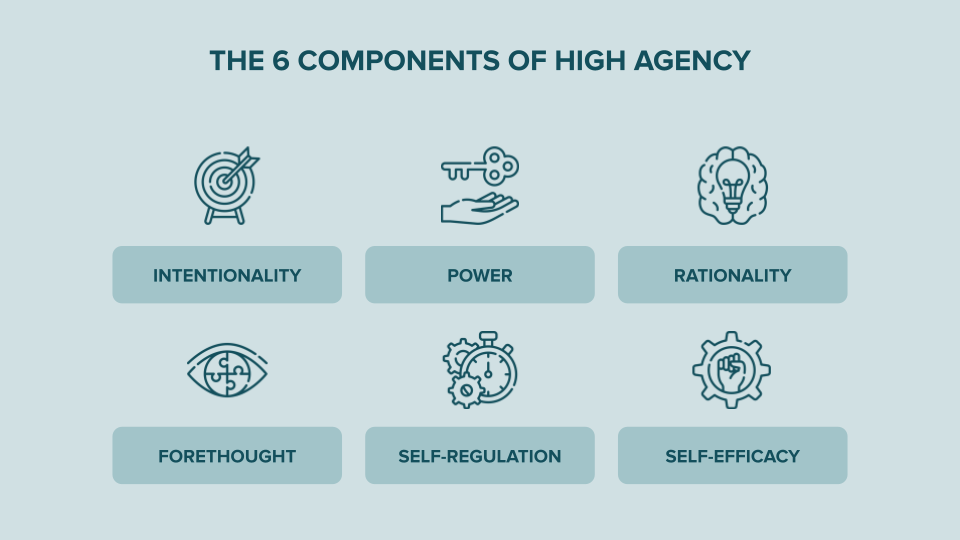Personal agency, or self-agency, describes the experiences we have when we set goals for ourselves and take action to achieve them. People with high agency feel a sense of control over their lives, and they can make decisions about what they want or need and act to meet those needs.
On the other hand, people with low agency may feel like something outside their control, such as luck or fate, is shaping their path. If someone has low agency, they may feel powerless to change the direction of their lives. And powerlessness is a very uncomfortable feeling for most of us.
Understanding ourselves as agents of change can help us set goals and take steps to improve our personal and professional lives. However, our sense of agency is affected by many factors, including access to resources and the environment. Let’s explore the science behind our sense of agency, and how you can develop high agency over time.
The six components of high agency
Research suggests that we begin developing our sense of agency as soon as we come into the world. Infants learn how to interact with their surroundings and discover ways to change their environments from their caregivers, and children learn to regulate their behaviors from observing their parents and caregivers.
In addition, Professor Duane Brown from the University of North Carolina explains that schools, after-school programs, and other activities give children the opportunity to make decisions for themselves, negotiate with others, and stand up for themselves, all of which contribute to developing high agency.
But our sense of agency continues to evolve throughout our lives. Dr Martin Hewson identified three characteristics that give rise to self-agency. The first, intentionality, assumes that humans are making conscious choices for themselves to improve their lives. Intentional humans tend to be goal orientated. They can consciously define their goals and identify action steps to achieve them.
Hewson also proposed that power is a critical component of self-agency. Power, in this case, means that a person has the resources, capabilities, and knowledge to act on their goals. Finally, the third component is rationality. Hewson suggests that humans, as rational beings, can understand the circumstances of their situations and keep track of the outcomes of their actions.
Proponents of social cognitive theory agree that these are essential components of self-agency but add three other traits to consider:
- Forethought. A person’s ability to choose the right actions to achieve their goals and anticipate the outcomes of their actions. Identifying possible outcomes comes from a person’s learning experiences.
- Self-regulation. A person’s capacity to monitor their emotions, behaviors, and motivations as they act upon their goals.
- Self-efficacy. A person’s belief in their ability to succeed.
In social cognitive theory, beliefs are as important as actions in developing a sense of agency. How a person understands themselves and their environment influences their ideas about what is possible, and will determine their level of personal agency.
From low agency to high agency
You have probably come across people with low self-agency in your everyday life. Perhaps you know a coworker who constantly complains about their workload but never takes it up with their supervisor, a family member who believes they are cursed with bad luck. If you are scratching your head trying to figure out why a smart person isn’t taking things into their own hands, it may be because they are struggling with low self-agency.
Low self-agency is not a moral failing; there are many social, economic, and cultural reasons people may feel that they have little control over their lives. But there are some practical strategies you can use to boost your sense of agency in your personal and professional life:
- Examine your beliefs. Would you describe yourself as someone with high agency, low agency, or somewhere in between? Do you feel a high sense of agency in certain areas of your life, like your career, and feel a low sense of agency when it comes to your family? What are the experiences and emotions behind your beliefs? Taking some time to reflect and journal about where you would like to have more control in your life can help you set goals for the future.
- Practice intentionality. You do not have to start with the big stuff. Setting a small intention at the beginning of each week can help you get in the habit of purposive thinking about your wants and needs. So read ten pages of your book this week, or finally organize your desk. Just make sure your intentions are achievable to keep the momentum going.
- Understand your circumstances. High agency requires resources like time, money, knowledge, and skills. What resources do you have that can help you create goals and take action on them? What resources do you need, and where can you find them? Or who can help you find them? Understanding your circumstances will help you remove the barriers that prevent you from achieving your goals.
- Find support. If you struggle with self-agency in your career, consider working with a career coach. A coach can help you articulate your career goals and support you while you take steps to achieve them. Mentors, supportive family members, and friends can also help you in your journey towards self-agency. Finally, if you believe traumatic experiences or other mental health struggles are impacting your agency, seek support from a licensed mental health care professional.
As much as we might like to, we can’t control every aspect of our lives. However, we can exercise more control over our aspirations by understanding what agency is, how we develop our sense of agency and uncovering ways to let go of feelings of powerlessness. Also, don’t forget – having a little belief in yourself and your capabilities go a long way in helping you get to where you want to be.

